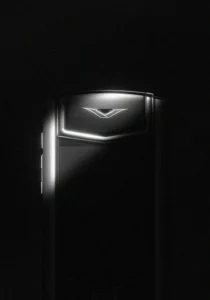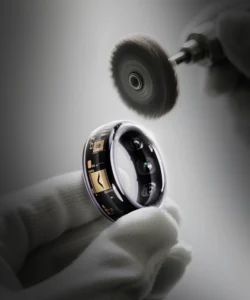
Winston AI, Originality.ai, GPTZero, Binoculars AI, Copyleaks, Ahrefs, ZeroGPT, QuillBot, and Scribbr are the top ai generator text detector choices in 2025. Each ai generator text detector is accurate, reliable, and easy to use. Teachers, companies, writers, and students all like these features. Recent tests and reviews show that each ai detection tool works well for different uses.
Key Takeaways
-
The best AI text detectors in 2025 are Copyleaks, Originality.ai, and GPTZero. They are very accurate and easy to use. Teachers, companies, and writers like these tools.
-
AI detectors use smart ways to find AI writing. They look at word patterns, sentence structure, and writing style. But no tool is perfect by itself.
-
Using more than one AI detector helps catch more mistakes. Checking flagged text by hand also helps. This makes the results more trustworthy.
-
Picking the right AI detector is important. You should think about language support, accuracy, and fairness. Make sure it fits what you need.
-
AI detectors need updates often. This helps them keep up with smarter AI writing. Updates also make sure detection stays fair and reliable.
Top AI Generator Text Detectors 2025
Best AI Detectors Overview
Some of the best ai detectors in 2025 are Winston AI, Originality.ai, GPTZero, Binoculars AI, Copyleaks, Ahrefs, ZeroGPT, QuillBot, Scribbr, and Turnitin. Each ai detection software has special features for different people. Winston AI checks for plagiarism and uses AI to look at text. This makes it good for hard tasks. Originality.ai is great for checking many files at once and showing patterns. GPTZero looks for GPT-made writing by using perplexity analysis. It is helpful as a second check. Binoculars AI and Copyleaks are very accurate and work with many languages. Ahrefs and ZeroGPT help with document checks and have easy dashboards. QuillBot and Scribbr are simple for students and writers to use. Turnitin is still a top pick for teachers because it has a strong interface.
Note: Many people like these ai detectors because they are accurate, simple to use, and can check big files.
|
AI Detector |
Independent Test Accuracy / Findings |
User Review Highlights |
|---|---|---|
|
ZeroGPT |
Says it is over 98% accurate; about 9.6% false positives |
Some mixed results; has trouble with some AI models |
|
QuillBot |
100% accurate in some tests; not always steady |
Good for first checks; results should be double-checked |
|
Copyleaks |
Over 99% accurate; 0.2% false positives |
Easy to use; gives lots of AI details |
|
GPTZero |
Good for GPT text; uses perplexity analysis |
Shows clear results; breaks down by sentence |
|
Originality.ai |
Checks many files at once; shows patterns |
Saves time; trusted by companies |
|
Turnitin |
Made for schools; strong interface |
Trusted by teachers; gives strong reports |
Why These AI Detection Tools Lead the Market
The best ai detection tools are popular because they are accurate and easy to use. Many ai detectors try to avoid mistakes and work in many languages. Copyleaks and Originality.ai can connect with content systems, which helps teams in different countries. GPTZero and Winston AI give feedback for each sentence, so results are easy to read.
Studies show some ai detection software says about 20% of AI-made text is human. This mistake can go up to 50% if people change or rewrite the text. Tools that give clear results and simple dashboards make users trust them more.
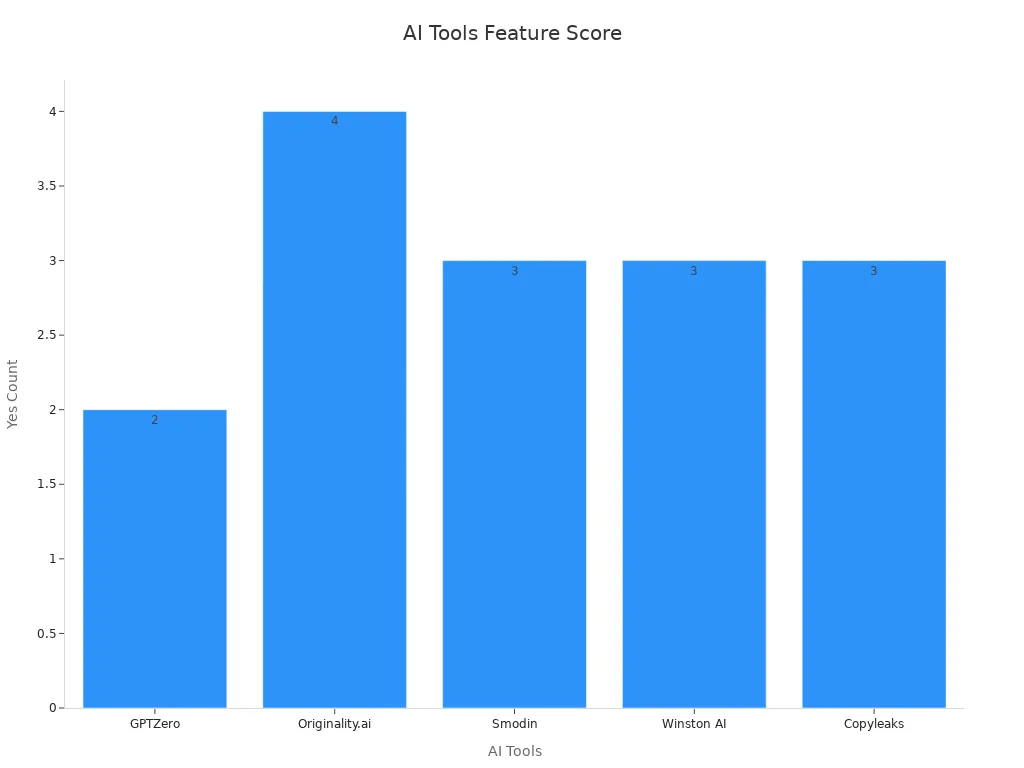
The best ai detectors mix strong accuracy with smart design. They help teachers, companies, and writers make good choices. As ai detection tools get better, users get more help with checking text and documents.
How AI Content Detectors Work

AI Detection Tools Explained
AI content detectors use smart technology to spot if text is written by AI or a person. These tools use a few main ways to do this:
-
They search for patterns in words that come from big training sets.
-
Machine learning guesses the next word in a sentence. If the words are too easy to guess, it might be AI writing.
-
Natural language processing helps the tool figure out what the text means and how it is built.
-
Data mining and text analysis check for special writing styles, sentence length, and word choices.
Most ai detection software uses deep learning to look at stylometric features. Classifiers trained on lots of data find small hints that show if writing is by AI or a person. Algorithms like n-grams and syntax analysis break down each sentence’s structure. The process starts when you put in the text. Then the system finds features, checks patterns, and gives a score that shows if AI wrote it. Some tools also check perplexity and burstiness, which show if the writing is easy to guess or has lots of changes.
Note: As AI models get better at copying how people write, ai content detectors must also get better to stay correct.
Relevance in 2025
In 2025, people need good ai detection tools more than before. Companies and schools want to make sure writing is real and can be trusted. Now, over 60% of AI training data comes from fake sources. This makes it harder to tell if writing is by AI or a person.
Rules like the EU AI Act say data must be high quality and follow the law. Human-in-the-loop checks are still needed for fairness and trust. New ai content detectors can now watch text in real time, spot strange things, and find out why mistakes happen. These features help lower false positives and make results better. Top companies care about data quality, keeping data safe, and tracking changes over time.
The market now uses AI for real business needs, not just tests. Good ai detection tools help groups lower risks, follow the law, and keep writing honest. As AI gets smarter, these tools will help protect the value of writing done by people.
Comparison of Top AI Detection Tools

Features and Accuracy
AI detectors in 2025 can do many things. They check text in different ways. The table below shows how top ai detectors compare. It looks at accuracy, features, and languages. Copyleaks and GPTZero are about 99% accurate. Originality.ai is 85-90% accurate with GPT-4 content. Most ai detectors now give confidence scores. They have dashboards you can see right away. They also let you scan many files at once. Some tools let you compare results from different detectors. This helps people trust the results more. Copyleaks works in over 30 languages. It can check code and rewritten text using AI. GPTZero and Originality.ai give deep reports and help teams work together.
|
Tool |
Starting Price |
Free Version |
Accuracy |
Key Features |
Language Support |
Integration Options |
|---|---|---|---|---|---|---|
|
Copyleaks |
$9.99 |
Yes (limited) |
~99% |
AI Insights, paraphrased content, code analysis, multi-detector comparison |
30+ languages |
API, LMS, browser extension |
|
GPTZero |
$14.99 |
Yes |
~99% |
Advanced analytics, multi-file scan, multi-detector comparison, vocabulary analysis |
English (more coming) |
LMS integrations |
|
Originality.ai |
$14.95 |
Limited free |
85-90% |
Bulk scan, plagiarism check, confidence scores, visual maps, multi-detector comparison |
English primarily |
API, browser extension, team management |
|
Undetectable AI |
$14.99 |
Yes |
Not specified |
Real-time analysis, AI Humanizer, probability scoring, multi-detector comparison |
50+ languages |
Web-based |
Good ai detection software should work most of the time. It should also show how it scores text.

Pricing and Accessibility
The price for ai detectors depends on what you need. Copyleaks starts at $9.99 each month. GPTZero and Originality.ai start at about $15 each month. Some tools have free versions but with limits. Big plans can cost up to $179 each month. These plans give API access and special help. You can change or stop your plan when you want. These tools work with LMS, browser add-ons, and APIs. This makes them easy for teams and single users. The chart below shows how much top ai detectors cost.
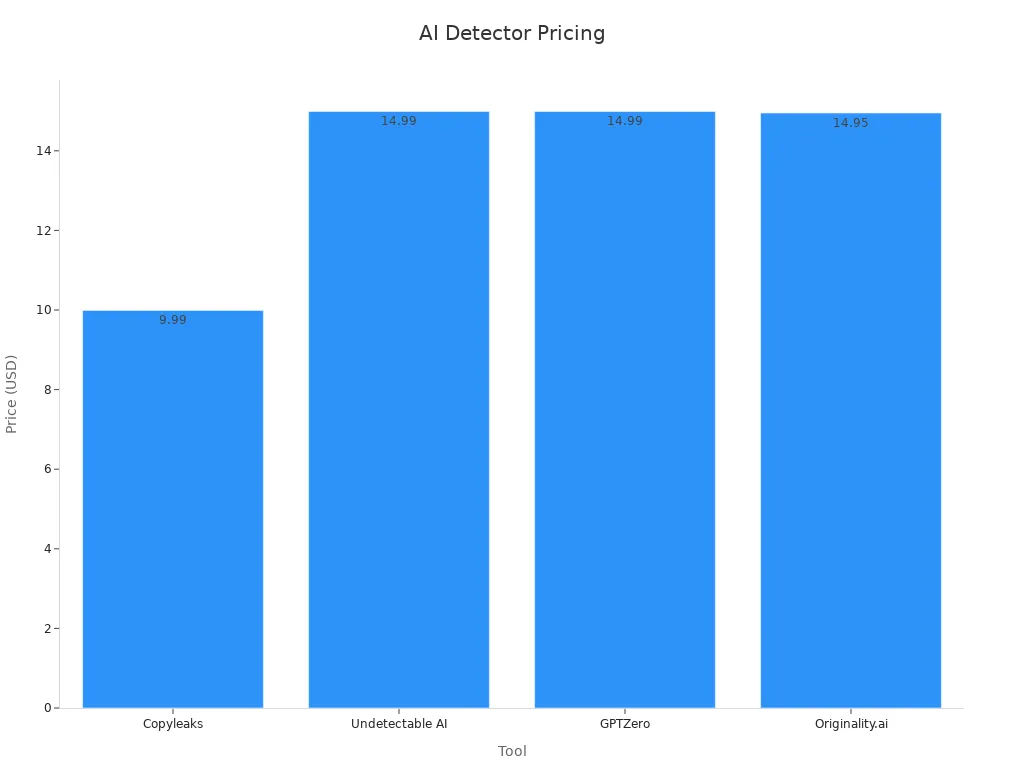
For 63% of businesses, price is very important when picking ai detectors.
Best Use Cases
Different people use ai detectors for different reasons:
-
Teachers like Copyleaks and Turnitin. They want high accuracy, LMS links, and good reports.
-
Companies pick Originality.ai for scanning lots of files and team tools.
-
Writers use GPTZero for deep reports and checking with more than one detector.
-
Students choose QuillBot and Scribbr for simple dashboards and easy checks.
A good ai generator text detector helps with strong testing and local checks. Teams should train users and manage risks for best results. Checking how well tools work and comparing detectors helps people pick the best one for their needs.
In-Depth Reviews of Best AI Detectors
Winston AI
Winston AI is one of the best ai detectors because it is very accurate and can do many things. Its detection rate is about 99%, which is just a little less than some other tools. People like that it is easy to use, works quickly, and supports many languages like English, French, Spanish, Dutch, German, and Chinese. Winston AI also has a plagiarism checker, an AI image detector, and tools that give feedback on writing. It can check scanned documents and images with OCR, so teachers and businesses find it useful.
Pros:
-
Supports many languages
-
Has plagiarism checker and OCR
-
Fast and simple to use
Cons:
-
Free version is limited; most features need payment
-
Sometimes says human writing is AI, especially if edited a lot
-
Paid plans might be too expensive for small groups
Note: Tests show Winston AI finds all AI text (100% recall), but its F1-score is 85.71%, so it sometimes makes mistakes. For important work, people should use more than one detector.
Originality.ai
Originality.ai is a top choice because it is strong at finding AI text and has smart analytics. It is usually first or second in tests with news, poems, and reviews. It is very good at finding changed AI text, with 96.7% accuracy, and only 2% false positives. Its bulk scan and visual maps help save time for teams and businesses.
|
Metric |
Originality.ai Result |
Competitors / Notes |
|---|---|---|
|
AI-generated Essay Detection Accuracy |
Highest among evaluated tools |
|
|
False Positive Rate |
2% |
One of the lowest false positive rates |
Pros:
-
Very accurate, even with changed AI text
-
Can scan many files and show results with maps
-
Few mistakes
-
Trusted by teachers and companies
Cons:
-
Only works well with English
-
Some features need a paid plan
Originality.ai does better than people at finding AI in STEM classes and is a great pick for anyone who needs a strong ai generator text detector.
GPTZero
GPTZero is good at finding AI writing, especially from GPT models. It uses perplexity analysis and shows results for each sentence. In tests, GPTZero found 65% of AI texts and 90% of human texts, so its total accuracy is 80%. It only makes mistakes 10% of the time, so teachers and writers can trust it.
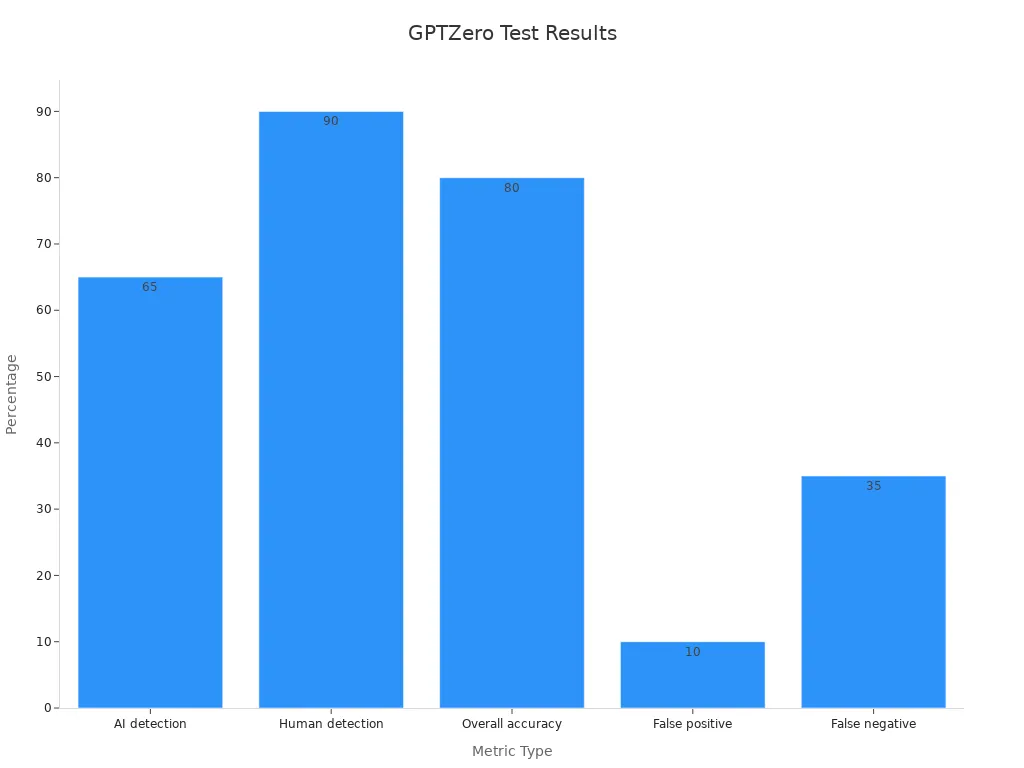
Pros:
-
Shows details for each sentence
-
Makes few mistakes
-
Easy-to-use dashboard
Cons:
-
Misses some AI texts (35% false negatives)
-
Works best with other ai detectors for full checks
Tip: GPTZero is good for checking results from other tools, so users can be sure.
Binoculars AI
Binoculars AI is great at zero-shot detection, so it does not need training data. It beats 18 other models in peer review tasks and gets true positive rates from 45% to 85% with only 1% false positives. At a 0.01% false positive rate, it is over 90% accurate, which means it is very exact. It can handle changes in text, so it is good for schools and research.
Key Features:
-
Zero-shot detection
-
Very accurate with few mistakes
-
Works for any subject
Limitations:
-
Not as good if you want almost no mistakes
-
Sometimes gets confused by expert-edited AI writing
Binoculars AI is best for researchers and reviewers who need to check many types of writing.
Copyleaks
Copyleaks is known as one of the best ai detectors because it gives lots of details and is clear about how it works. It supports over 30 languages and can check code and compare results from different detectors. Copyleaks is very accurate and makes few mistakes, as shown in studies with schools and research.
|
Metric |
الوصف |
Purpose in AI Detection |
|---|---|---|
|
Shows how the tool sorts writing |
Helps see mistakes and correct answers |
|
|
Accuracy |
Gets most answers right |
Good for both human and AI writing |
|
F-beta Score |
Balances finding real AI and not making mistakes |
Helps avoid wrong answers |
Pros:
-
Very accurate and only 0.2% mistakes
-
Checks many languages and code
-
Explains how it works and keeps getting better
Cons:
-
Some features need a paid plan
Note: Copyleaks is best for teachers and businesses who want deep reports and to compare tools, but people should still check important work by hand.
Ahrefs AI Detector
Ahrefs AI Detector works well with other Ahrefs tools, so it helps writers and SEO workers check content fast. The dashboard is easy to use and it can check web documents. People say it is handy, but there are not many tests to prove how accurate it is.
Pros:
-
Easy to use with Ahrefs tools
-
Checks documents quickly
-
Simple dashboard
Cons:
-
Not much proof of how well it works
-
Has fewer features than other ai detectors
Ahrefs AI Detector is good for marketers and SEO workers who want quick checks in their daily work.
ZeroGPT
ZeroGPT says it is over 98% accurate, but real tests show different results. It is good at finding AI text that has not been changed, but it has trouble with changed or hard writing. In schools, it can say real writing is AI up to 80% of the time, which is a lot of mistakes.
|
Aspect |
Reported Figures / Findings |
|---|---|
|
Claimed Accuracy |
Above 98% (marketing) |
|
Real-World Accuracy Range |
|
|
False Positive Rates |
20% to 80% in academic/human texts |
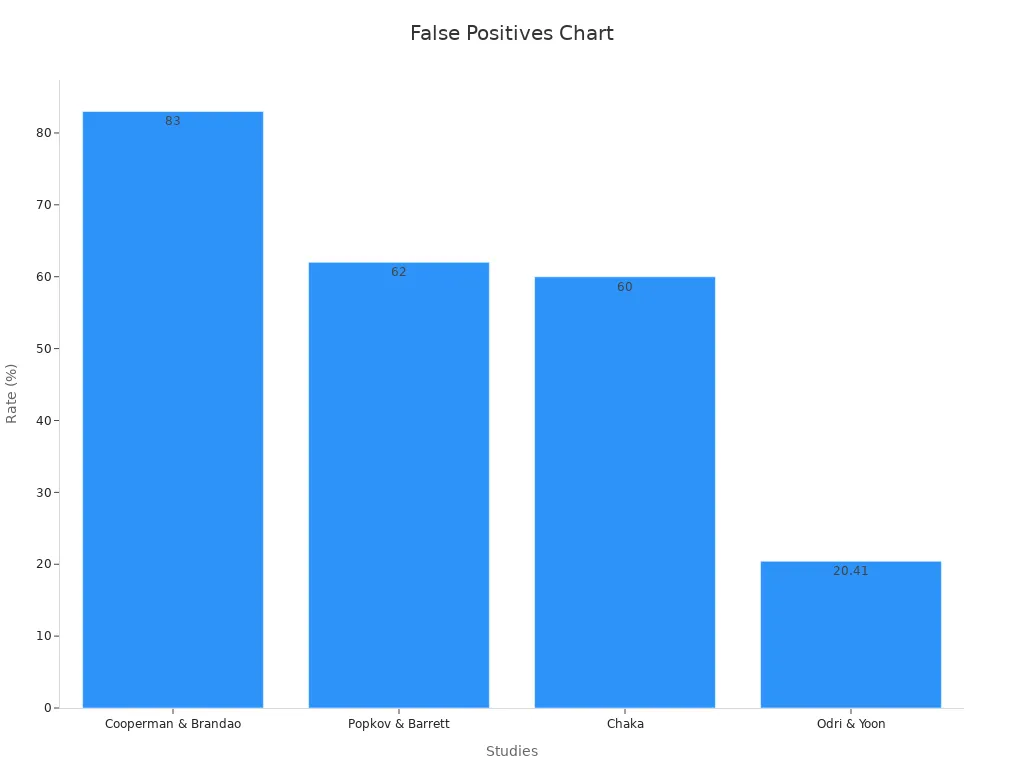
Pros:
-
Free version to try
-
Good at finding AI text that is not changed
Cons:
-
Makes lots of mistakes
-
Not steady with changed or hard writing
Teachers and experts say to use ZeroGPT with other detectors because it makes many errors.
QuillBot
QuillBot has a simple AI detector that students and writers like because it is easy. The free version finds about 64% of AI writing but says 29% of real writing is AI. The paid version is better but still has trouble with mixed or changed writing.
|
Text Type |
Detection Accuracy |
Remarks on Accuracy |
|---|---|---|
|
AI-generated text |
64% flagged |
Missed some AI writing |
|
Human-written text |
29% flagged |
Said real writing was AI |
|
Mixed AI + Human |
31% flagged |
Hard to tell the difference |
Pros:
-
Free and cheap paid plans
-
Simple dashboard
Cons:
-
Not as accurate as top ai detectors
-
Has trouble with mixed or changed writing
QuillBot is good for a quick first check, but people should use other detectors for important work.
Scribbr
Scribbr is easy to use and its paid version is about 84% accurate. It works well with plain AI writing and is very good at finding AI in cover letters. But it does not do well with marketing writing or edited AI text, getting 0% on blog posts and product descriptions.
|
Content Type |
Scribbr Detection Accuracy |
Originality.ai Detection Accuracy |
|---|---|---|
|
Blog Posts |
0% |
85% |
|
Product Descriptions |
0% |
85% |
|
Promotional Emails |
0% |
85% |
|
Cover Letters |
95% |
96.7% |
Pros:
-
Easy to use
-
Good for plain AI writing and cover letters
Cons:
-
Not good with marketing or changed writing
-
Sometimes says real writing is AI
For best results, people should use Scribbr with other ai detectors, especially for different types of writing.
Turnitin AI Detector
Turnitin AI Detector is trusted by teachers. Its basic accuracy is about 61%, and it is second best at finding AI writing after Copyleaks. But if someone tries to trick it, accuracy drops by 42.1%. Turnitin says it is fair to non-native English speakers, and studies show it is important to test with both AI and real writing.
Pros:
-
Used a lot in schools
-
Good reports and works with LMS
Cons:
-
Not as good with changed or GPT-4 writing
-
Does worse if people try to trick it
Turnitin is best when used with other detectors, especially for schools that want good reports and easy links to their systems.
Choosing the Right AI Generator Text Detector
Key Factors to Consider
Picking the best ai detectors means thinking about many things. You need a tool that works with your document’s language and topic. The training data should be like real writing from your area. If you use more than one language, pick ai detectors that have different data for each language. Using the same data for all languages does not work well.
A good dataset has many types of writing. This means it should have short and long texts, different styles, and many prompts. The best ai detectors can check documents written by both people and AI. Some decoding methods, like nucleus sampling, help make fake AI text seem real. This makes it easier for the detector to spot.
It is getting harder to tell AI from human writing. New models like GPT-4 write almost like people. This makes it tough for detectors to work well. If AI is trained or changed in special ways, it can be even harder to catch. These changes can confuse the detector.
You should also think about fairness and bias. Some ai detectors might not be fair to people who do not speak English as their first language. No single tool is perfect for every job. Using more than one detector and having a person check the results helps a lot. For important checks, you should set the tool to be careful. This helps stop mistakes.
Key points to remember are:
-
Pick detectors with lots of different writing in their data.
-
The tool should check both human and AI writing together.
-
Look for tools that use more than one decoding method.
-
Keep up with new AI models.
-
Watch out for bias, especially for people who are not native speakers.
-
Use more than one detector and have people check big decisions.
-
Set the tool to be careful so it does not make too many mistakes.
Tip: Always update your ai detectors and check how well they work. This helps keep them fair and correct as AI changes.
Limitations and Best Practices
Common Pitfalls
Many people think ai detectors always work perfectly, but they have problems. Studies show ai detectors sometimes say real writing is AI, especially for people who do not speak English as their first language or have learning problems. Some ai detectors mark special ways of writing, like Black American English, more than regular English. Paraphrasing tools can trick ai detectors, so it is hard to catch AI-made text. Most ai detectors do not explain how they score writing. This makes it hard to understand the results. People may get blamed for cheating when they did not, and this can make people lose trust.
|
Aspect |
Details & Findings |
|---|---|
|
Detection Techniques |
Perplexity analysis, burstiness, pattern recognition, statistical analysis |
|
Accuracy Benchmarks |
Originality.ai: ~97% accuracy; RAID: 85%-96.7% on paraphrased content |
|
False Positive Rates |
Turnitin: <1% on docs with >20% AI content; ~4% at sentence level |
|
Limitations |
High false positives for non-native speakers; paraphrasing tools can evade detection |
|
Expert Opinions |
Reliable detection not possible with current tools; bias and privacy concerns remain |
Teachers and researchers say not to trust ai detectors alone. Using them too much can hurt students and workers, especially if they wrongly say a person used AI. It is hard to tell the difference between AI help and real writing.
Tips for Reliable Results
To get better results, use ai detectors as a first check, not the only answer. People should still look at the writing to see if it is real and good. Some best ways to use ai detectors are:
-
Use ai detectors to find possible AI writing, then check by hand.
-
Mix AI and real writing to make documents seem more real.
-
Change sentence length and style so patterns are not easy to spot.
-
Add your own ideas and thoughts to show it is human writing.
-
Keep ai detectors up to date and test them with new writing.
-
Be honest about using AI when you need to.
-
Watch for mistakes from ai detectors and change settings if needed.
-
Help people think for themselves and be creative along with using ai detectors.
Tip: No ai detector is perfect. People checking the results helps keep things fair and honest.
The best AI text detectors in 2025 include Copyleaks, OpenAI Detector, and Grammarly Business. These tools are very accurate and help in real situations. Each one is good for different people. Copyleaks and GLTR help teachers and school teams. Grammarly Business and Writer.com work well for companies and people who make content. Big publishers like to use enterprise tools such as AI Detector Pro. Using more than one detector makes results better. Updating these tools often keeps them working as AI changes.
|
Detector Name |
Accuracy & Impact Metrics |
Pricing Range |
Best For |
|---|---|---|---|
|
OpenAI Detector |
High accuracy, 35% less low-quality content |
~$49/month |
Publishers, marketers, academics |
|
Copyleaks AI Detector |
Dual detection, 30% less AI plagiarism |
~$39/month |
Schools, media organizations |
|
Grammarly Business |
Real-time feedback, 25% more engagement |
~$12/month/user |
Businesses, creators |
|
Content at Scale |
50% faster review, better content quality |
~$44/month |
Publishers, agencies |
|
GLTR |
Improved research detection, open-source |
مجاناً |
Researchers, publishers |
|
Writer.com AI Detector |
30% more originality, seamless integration |
~$45/month |
Businesses, content teams |
|
AI Detector Pro |
45% less AI content published, scalable |
~$59/month |
Enterprises, publishers |
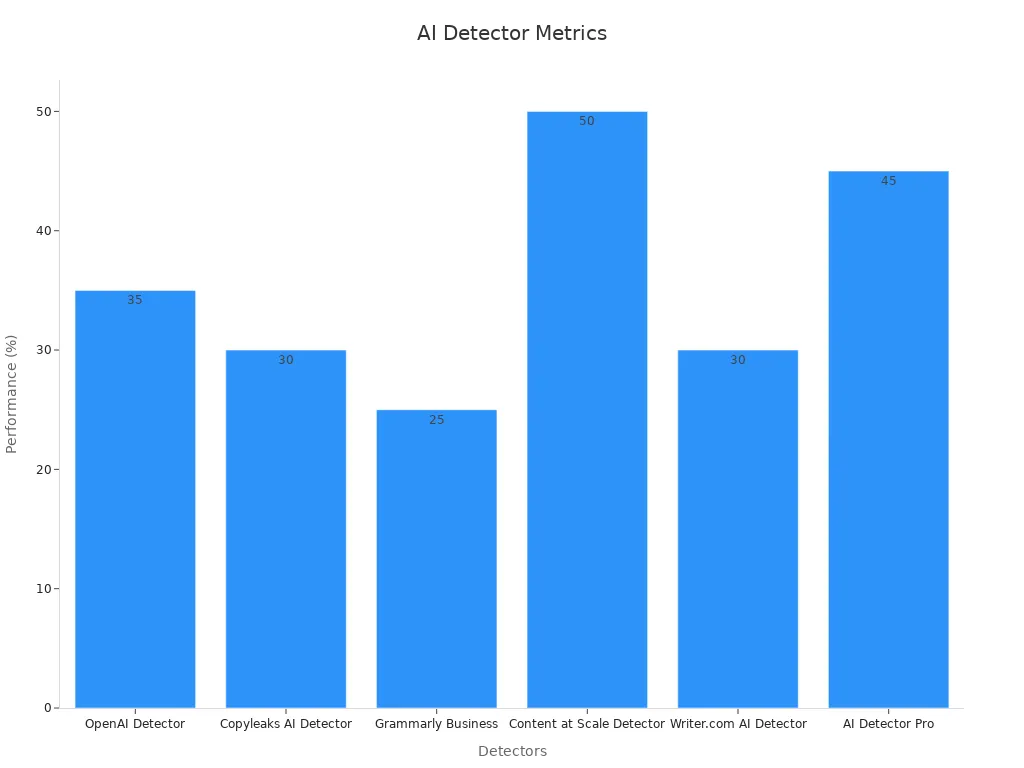
Tip: Using more than one detector and updating them often helps teams keep up as AI writing tools get better.
التعليمات
What is the most accurate AI text detector in 2025?
Originality.ai and Copyleaks are the most accurate. They find AI-made writing with over 97% accuracy. Teachers and companies trust these tools for good results.
Can AI detectors identify paraphrased or edited AI content?
Most top detectors, like Copyleaks and Originality.ai, can find changed or lightly edited AI text. But if someone rewrites a lot or mixes human and AI writing, it gets harder to catch.
Do AI detectors work with multiple languages?
Many top detectors, like Copyleaks and Winston AI, work with over 30 languages. Some, like Originality.ai, mostly work with English. People should check language support before picking a tool.
Are free AI text detectors reliable?
Free tools, like ZeroGPT and QuillBot, do basic checks. They often miss hard or changed AI writing. Paid tools are more accurate and have more features.
How can users reduce false positives when using AI detectors?
People should use more than one detector and look at flagged writing by hand. Changing settings and keeping tools updated also helps lower mistakes.

